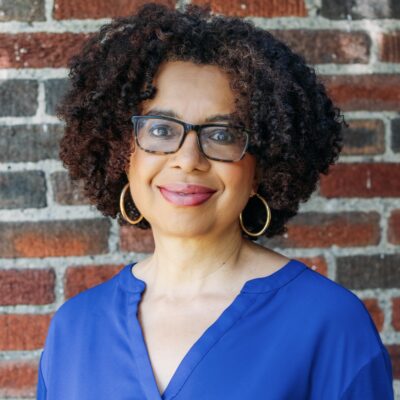Hard Histories: Slavery and the Rise of Catholic Universities
Event Actions

Join Hard Histories at Hopkins for a virtual discussion about the centrality of slavery to the rise of Catholic universities. In recent years, Georgetown University and Loyola University Maryland have been grappling with their institutions’ connections to enslavement. Jesuit priests sold 272 enslaved people to two Louisiana planters in 1838. The Maryland Province of the Society of Jesus received the proceeds from that sale. Jesuits used the money to financially prop up Georgetown, and support the establishment of Loyola University Maryland in 1852. Both universities are now reckoning with questions surrounding reconciliation and reparations.
This webinar will feature two key experts in this history. Journalist Rachel L. Swarns is the author of the book The 272: The Families Who Were Enslaved and Sold to Build the American Catholic Church. The book centers on one family – the Mahoneys – and their members’ experiences with enslavement, freedom, and the Catholic church across centuries. Dr. David Carey Jr. is the Doehler Chair in History at Loyola, and a key leader of the university’s task force that has studied – and is newly publishing about – Loyola’s connections to the 1838 sale. Swarns and Carey will be in discussion with Hard Histories at Hopkins Project Director Dr. Martha S. Jones.
Speakers:
 David Carey Jr. holds the Doehler Chair in History at Loyola University Maryland. In addition to writing more than thirty peer-reviewed articles and essays, he is the author of I Ask for Justice: Maya Women, Dictators, and Crime in Guatemala, 1898-1944, which was the co-recipient of the 2015 Latin American Studies Association Bryce Wood Book Award. His most recent books are Oral History in Latin America: Unlocking the Spoken Archive and Health in the Highlands: Indigenous and Scientific Medicine in Guatemala and Ecuador. He has authored three other books and has edited or co-edited three volumes. Among other entities, the Fulbright, American Philosophical Society, and John Simon Guggenheim Foundation have supported his research and scholarship. He also has served on the Presidential Task Force Studying Slavery at Loyola University (2022-2024) and co-edited (along with two students) Untold Truths: Exposing Slavery and Its Legacies at Loyola University Maryland (2024).
David Carey Jr. holds the Doehler Chair in History at Loyola University Maryland. In addition to writing more than thirty peer-reviewed articles and essays, he is the author of I Ask for Justice: Maya Women, Dictators, and Crime in Guatemala, 1898-1944, which was the co-recipient of the 2015 Latin American Studies Association Bryce Wood Book Award. His most recent books are Oral History in Latin America: Unlocking the Spoken Archive and Health in the Highlands: Indigenous and Scientific Medicine in Guatemala and Ecuador. He has authored three other books and has edited or co-edited three volumes. Among other entities, the Fulbright, American Philosophical Society, and John Simon Guggenheim Foundation have supported his research and scholarship. He also has served on the Presidential Task Force Studying Slavery at Loyola University (2022-2024) and co-edited (along with two students) Untold Truths: Exposing Slavery and Its Legacies at Loyola University Maryland (2024).
 Rachel L. Swarns is a journalist, author, and associate professor of journalism at New York University who writes about race and race relations as a contributing writer for The New York Times, where she served as a reporter and correspondent for 22 years. Her articles about Georgetown University’s roots in slavery touched off a national conversation about American universities and their ties to this painful period of history. She is the author of The 272: The Families Who Were Enslaved and Sold to Build the American Catholic Church (Random House, 2023)American Tapestry: The Story of the Black, White and Multiracial Ancestors of Michelle Obama (Amistad/Harper Collins, 2012) and a co-author of Unseen: Unpublished Black History from the New York Times Photo Archives (Hachette/Black Dog & Leventhal, 2017.) The 272 was selected as one of the notable books of 2023 by the New York Times Book Review, the New Yorker, Time magazine, the Washington Post, and Kirkus Reviews and was longlisted for the 2024 Andrew Carnegie Medal. Her work has been recognized and supported by the National Endowment for the Humanities, the Ford Foundation, the Biographers International Organization, the Leon Levy Center for Biography, the MacDowell artist residency program, and others. In 2023, she was elected to the Society of American Historians.
Rachel L. Swarns is a journalist, author, and associate professor of journalism at New York University who writes about race and race relations as a contributing writer for The New York Times, where she served as a reporter and correspondent for 22 years. Her articles about Georgetown University’s roots in slavery touched off a national conversation about American universities and their ties to this painful period of history. She is the author of The 272: The Families Who Were Enslaved and Sold to Build the American Catholic Church (Random House, 2023)American Tapestry: The Story of the Black, White and Multiracial Ancestors of Michelle Obama (Amistad/Harper Collins, 2012) and a co-author of Unseen: Unpublished Black History from the New York Times Photo Archives (Hachette/Black Dog & Leventhal, 2017.) The 272 was selected as one of the notable books of 2023 by the New York Times Book Review, the New Yorker, Time magazine, the Washington Post, and Kirkus Reviews and was longlisted for the 2024 Andrew Carnegie Medal. Her work has been recognized and supported by the National Endowment for the Humanities, the Ford Foundation, the Biographers International Organization, the Leon Levy Center for Biography, the MacDowell artist residency program, and others. In 2023, she was elected to the Society of American Historians.

Dr. Martha S. Jones is the Society of Black Alumni Presidential Professor, Professor of History, and a Professor at the SNF Agora Institute at Johns Hopkins University. She is also a legal and cultural historian whose research explores how Black people have shaped the story of American democracy, and today extends to work on memorial landscapes and family memoir. Jones directs the Hard Histories at Hopkins Project which, since 2020, has examined the role of slavery and racism at the Johns Hopkins University and Hospital.
Jones’ most recent book, Vanguard: How Black Women Broke Barriers, Won the Vote, and Insisted on Equality for All (2020), received the 2021 Los Angeles Times Book Prize for History. Her 2018 book, Birthright Citizens: A History of Race and Rights in Antebellum America, was recognized with awards from the American Historical Association, Organization of American Historians, American Society for Legal History, and Baltimore City Historical Society Scholars.
This event is part of a series of conversations hosted by Hard Histories in spring 2024, exploring the histories of Blackness, slavery, and racism in the Maryland area and beyond. Launched in fall 2020, the Hard Histories at Hopkins Project examines the role that racism and discrimination have played at Johns Hopkins. Blending research, teaching, public engagement, and the creative arts, Hard Histories aims to engage our broadest communities—at Johns Hopkins and in Baltimore—in a frank and informed exploration of how racism has been produced and permitted to persist as part of our structure and our practice.
